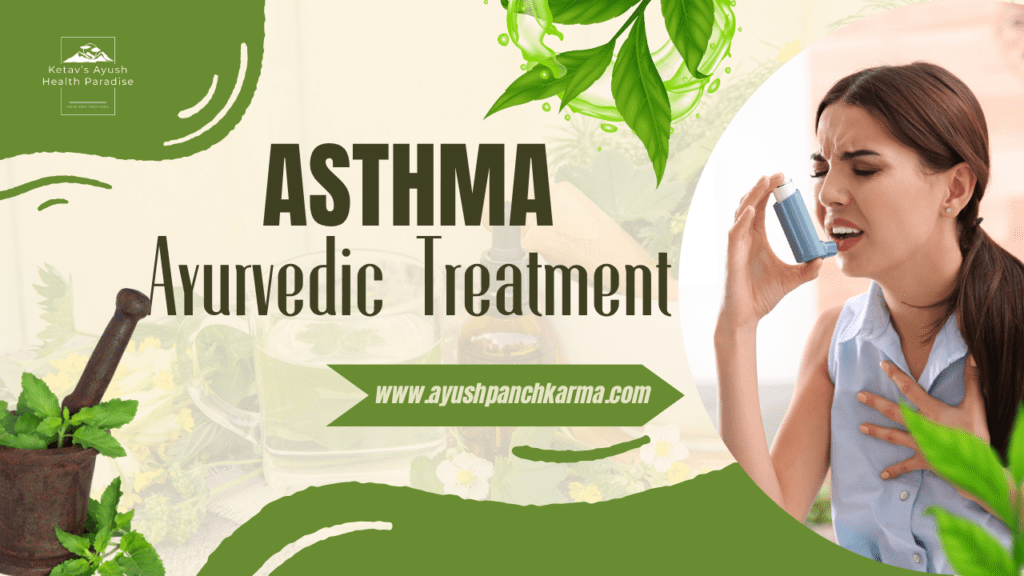Asthma, or Tamak Shwasa in Ayurveda, is a complex respiratory disorder affecting millions worldwide. While modern medicine addresses symptoms with inhalers and steroids, Ayurveda offers a holistic solution that targets the root cause: dosha imbalance, especially of Kapha and Vata. Through personalized asthma Ayurvedic treatment, including deep detoxification with Panchakarma, patients often experience long-term relief, improved lung function, and fewer flare-ups.
In this article, we’ll explore:
- Ayurvedic understanding of asthma
- Key Panchakarma treatment benefits
- Scientific evidence supporting these therapies
- A practical six‑step treatment program
- Herbs and lifestyle strategies for chronic lung health
1. Understanding Asthma Through Ayurvedic Wisdom
In Ayurveda, asthma is known as Tamak Shwasa, and is considered a result of aggravated Kapha and Vata doshas. This imbalance leads to:
- Kapha accumulation: Congestion, mucus, and blockage in the respiratory channels.
- Vata disruption: Airway spasms, irregular breathing, and dry coughs.
Modern medicine often treats asthma symptoms, but asthma Ayurvedic treatment addresses the underlying doshic disturbances. When balanced correctly, the lungs regain their ability to function naturally, without dependence on constant external medication.
2. Panchakarma Treatment Benefits for Asthma
Panchakarma is the cornerstone of Ayurvedic detoxification. It involves five cleansing therapies that eliminate toxins (Ama), balance doshas, and rejuvenate the body. For asthma patients, Panchakarma treatment benefits are particularly powerful:
- Root-cause cleansing: Clears Kapha and accumulated mucus from the lungs.
- Balanced breathing: Reduces Vata-induced breathlessness and wheezing.
- Lung rejuvenation: Promotes healthy bronchial function and airflow.
- Reduced inflammation: Herbal therapies soothe irritated respiratory tissues.
- Stronger immunity: Prevents asthma attacks triggered by allergies or infections.
Many patients undergoing asthma Ayurvedic treatment with Panchakarma report easier breathing and significantly fewer asthma episodes over time.
3. Your Step-by-Step Panchakarma Journey
Here’s a typical Panchakarma program for asthma:
A. Initial Evaluation
A detailed health assessment identifies dosha imbalances, digestive strength (Agni), and specific respiratory issues.
B. Purva Karma (Preparation)
- Snehan (Oleation): Massage with medicated oils to loosen toxins.
- Swedana (Fomentation): Herbal steam to liquefy Kapha and clear respiratory passages.
C. Pradhana Karma (Main Detox)
As per condition, Ayurveda will decide the most suitable Pradhana Karma (Main Detox) procedures:
- Vamana (Emesis): Therapeutic vomiting to eliminate Kapha and clear congestion.
- Virechana (Purgation): Herbal laxatives remove Pitta and toxins from the digestive tract.
- Basti (Medicated Enema): Regulates Vata and nourishes the lungs from within.
- Nasya (Nasal Drops): Herbal oils clear the nasal cavity and improve respiration.
These steps offer powerful Panchakarma treatment benefits, especially for chronic respiratory issues like asthma.
D. Paschat Karma (Post-Care)
- Diet (Samsarjana Krama): Easily digestible, warm meals support digestive recovery.
- Rasayana (Rejuvenation): Herbal supplements boost immunity and repair lung tissues.
- Breathing & Yoga: Practices like Anulom Vilom enhance lung strength and breath control.
Lifestyle Tips
- Eat warm, cooked meals that balance Kapha (avoid dairy, fried, or cold foods).
- Stay warm and avoid cold exposure, especially early morning or late night.
- Practice pranayama daily to train your lungs.
- Avoid allergens that trigger flare-ups, including dust and pollen.
These additions enhance the effects of Panchakarma treatment and prevent asthma recurrence.
4. Timeline & What to Expect
Our 21-day package is structured as follows:
- Week 1: Snehan & Swedana; loosen mucus and toxins
- Week 2: Detox phase (Vamana, Virechana, Basti); improved breathing
- Week 3: Rasayana and pranayama; recovery and rejuvenation
Visible benefits often begin in the first 7–10 days and continue long after the program ends—especially when daily routine and herbs are followed.
5. Final Thoughts
If you’re seeking a long-lasting, natural approach to manage asthma, asthma Ayurvedic treatment using Panchakarma may be your answer. Backed by centuries of practice and modern studies, this therapy goes beyond symptom control—it restores respiratory health, balances immunity, and empowers your body to breathe freely again.
Ready to Start?
- 📅 Book your Ayurvedic consultation
- 🧘 Begin your Panchakarma plan
- 🌿 Adopt the lifestyle that supports clear, natural breathing
Take the step toward healing. Experience the Panchakarma treatment benefits and reclaim your breath—naturally and holistically.


